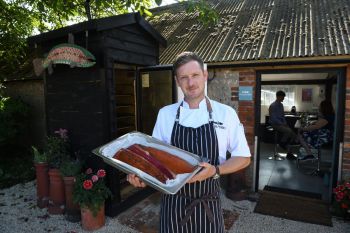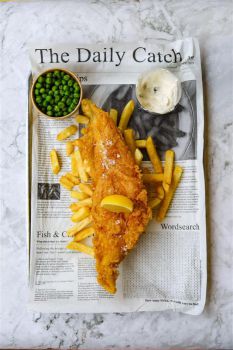The future of food: why is it important to consume sustainable fish and seafood?
Posted on behalf of: Michael King, Sussex Uni Food’s Executive Chef
Last updated: Monday, 24 February 2025

Mike at Fins & Forks

Fish and chips, anyone?
My passion for ocean sustainability stems from a lifelong love of fish, fishing, and responsible cookery. This deep connection was further cultivated during the pandemic when I founded Fins & Forks, a business blending fishing and cookery experiences with a focus on responsible sourcing.
One of my proudest achievements was developing my cold smoked chalkstream trout, a sustainable and local alternative to farmed smoked salmon, which earned global recognition with a 3-star rating at the 2022 Great Taste Awards.
My ethos
Catch it responsibly yourself, only take what you need, treat it with respect, and turn it into something you are proud of. While not always practical for everyone (and often quite a time-consuming pursuit, as my wife frequently reminds me), this ethos shapes the choices I make as a chef.
At Sussex, I strive to bring this philosophy to life, ensuring that if you choose to eat fish and seafood here, we’ve done the hard work for you through responsible procurement and sourcing decisions.
Why choose sustainable fish?
For those relying on oceans and seas as a protein source, choosing sustainable fish is not just a responsibility: it’s a duty. Overfishing, habitat destruction, and climate change threaten fish stocks, making responsible sourcing essential for preserving marine ecosystems and ensuring future food security.
Unsustainable fishing practices cause significant harm to marine ecosystems by disrupting the delicate balance of aquatic life, often leading to the collapse of vital habitats such as coral reefs and seagrass beds. These practices severely deplete fish populations, pushing some species to the brink of extinction and reducing biodiversity. As a result, the livelihoods of millions of people who rely on healthy oceans for food, income, and cultural traditions are endangered, creating economic instability, and threatening global food security.
Addressing these issues requires urgent action to implement sustainable fishing methods and protect marine resources. Nearly 35% of global fish stocks are overfished, according to the Food and Agriculture Organisation, with many species on the brink of collapse. By prioritising sustainably harvested seafood, we help protect vulnerable species and support resilient fishing communities.
Our approach at Sussex
Here at Sussex, we champion Marine Conservation Society (MCS) Best Choice species like chalkstream trout, hake, haddock and mackerel. By exclusively using Best Choice-rated fish, we reduce pressure on overfished species while enhancing our menus with diverse, high-quality options.
We are proud to have achieved a 91% score in the Sustainable Restaurant Association Accreditation, including an impressive 97% in the fish and seafood category. Our commitment has elevated our campus food offer, with initiatives like our Friday fish and chips special featuring freshly landed, North Atlantic haddock—a (currently) truly sustainable choice that has been well received from you guys, our customers.
What about the big five?
In the UK, over 80% of the fish consumed comes from “the big five”: tuna, cod, haddock, prawns and salmon. Of these, only one - haddock - can currently be considered a truly sustainable choice (due to responsible fisheries management and lower environmental impact) as highlighted in the Marine Conservation Society's Good Fish Guide, which is why it’s central to our fish and chip offer on Fridays.
As for the others, their sustainability and ethical issues require more scrutiny which I will save for next time… Apart from prawns, as you may have noticed they have disappeared from our offer across campus.
Where did all the prawns go?
We recently removed warm water prawns from our supply chain due to concerns over eyestalk ablation, a common but controversial practice in prawn farming. This involves destroying prawns’ eyestalks to encourage reproduction, a procedure criticised for causing pain and stress.
Critics rightly argue that this practice is inhumane and there are calls for reform to emphasise ethical and sustainable alternatives. By eliminating prawns from our menus, we stand in solidarity with these reforms and prioritise animal welfare in our sourcing practices.
Want to learn more?
Sustainable fish is a complex and ever-evolving topic. Beyond environmental impact, there are deeper issues of welfare and ethics to consider.
By making responsible seafood choices, we can help protect marine life, support ethical fisheries, and promote local, seasonal food that benefits both people and the planet.
For those looking to start their sustainability journey, the Marine Conservation Society’s Good Fish Guide is an excellent resource.
Until next time…
This work supports the UN’s Sustainable Development Goals: SDG 12 (responsible consumption and production).You can read more about our work on the SDGs here.

